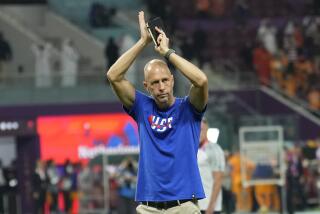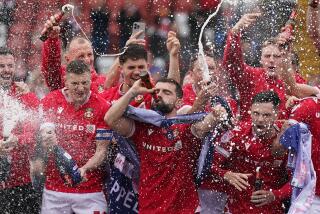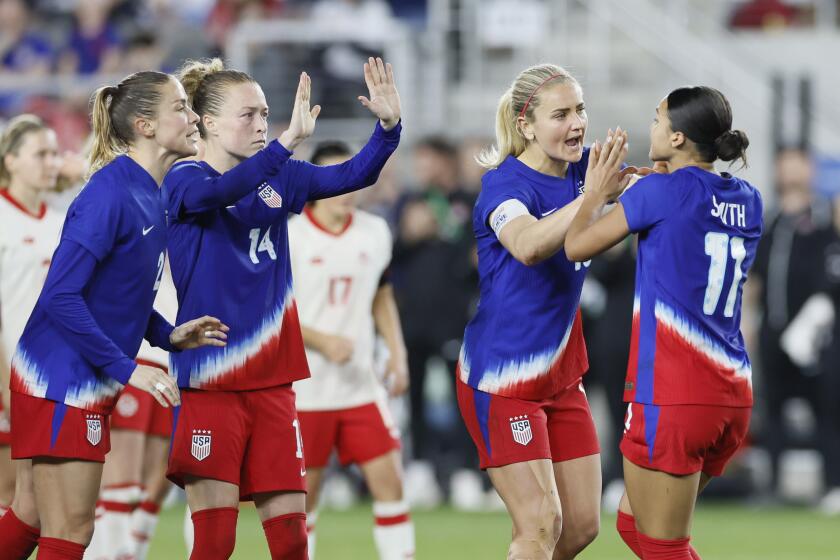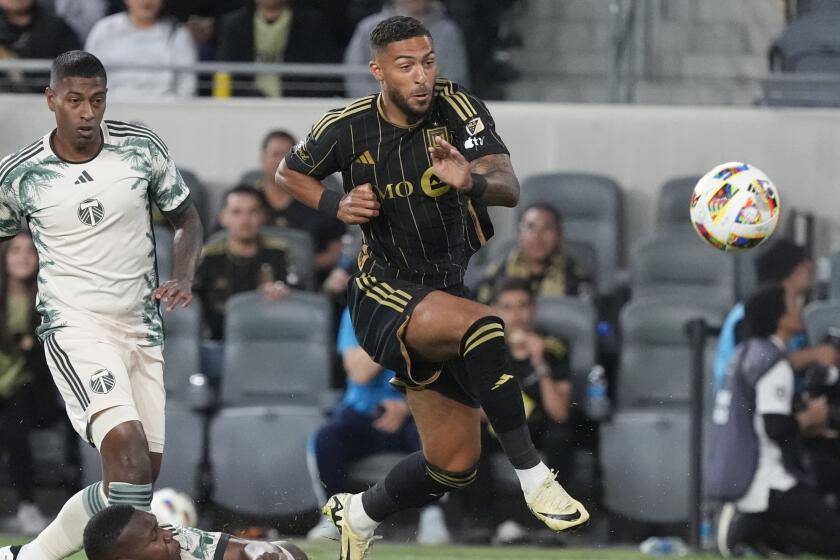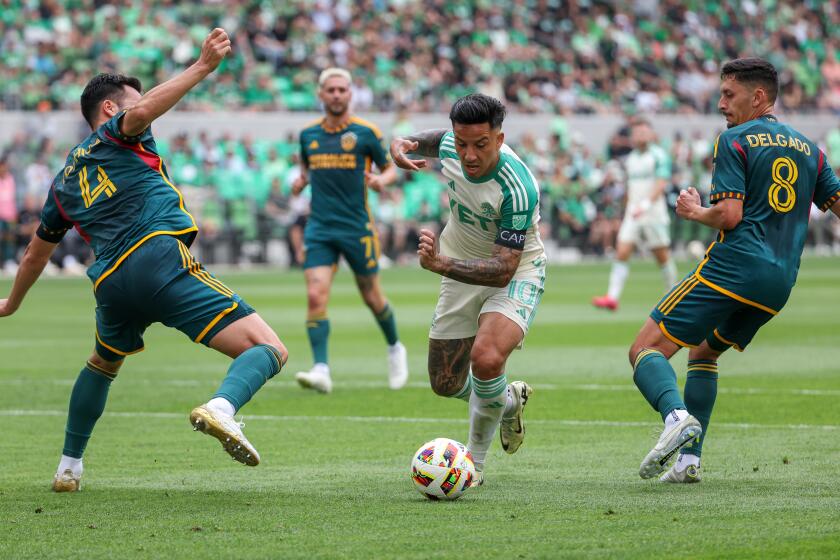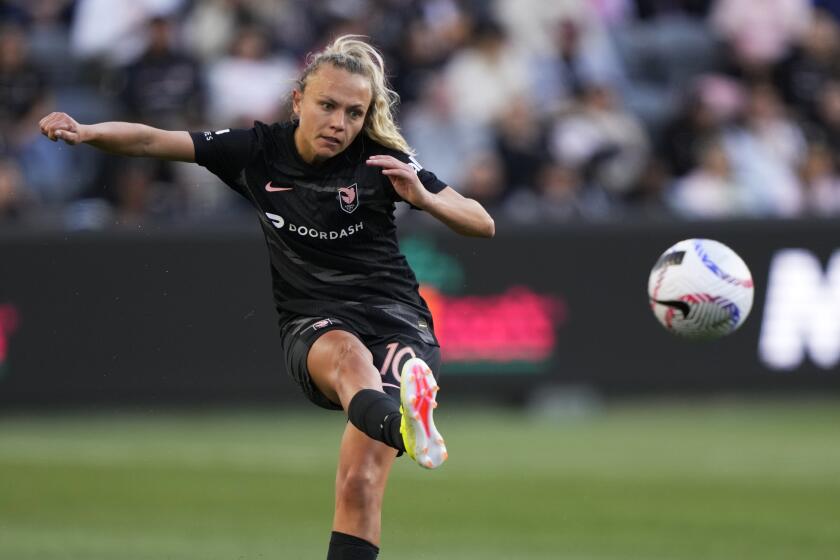They Must Reload, Not Rebuild
They came, they saw, they didn’t quite conquer but they left satisfied with what they had accomplished.
That, in a sentence, sums up the sentiment surrounding the United States World Cup team, which flew home Saturday lifted by the knowledge that it had restored the credibility of American soccer.
Advancing to the quarterfinals and then not giving an inch in foot-to-foot combat with Germany was more than could have been hoped for when Coach Bruce Arena and his players set out on this journey almost a month ago.
Now the journey is over and Cobi Jones and company can rest easy in the knowledge that a new generation has to pick up the U.S. banner and, hopefully, carry it to Germany in 2006 to renew the fight.
Whether Arena will be leading the charge is to be determined. To judge by his comments Saturday, however, he is hungry for more.
“It’s a matter of respect,” Arena said. “We’ve earned a little bit more, but not enough. That’s fine. We have to keep moving forward and try to get better.
“The one way you shut everyone up is you win. You’ve got to step on the field and just beat them. Period. Bottom line.”
The bottom line on the 2002 World Cup team was that it went 2-2-1, scored seven goals and gave up seven goals. It was a .500 achievement in a tournament in which the majority of the teams did far worse.
Throw out the loss to Poland as an aberration, and the Americans did just fine.
Among the impressive accomplishments were victories over Portugal and Mexico and a tie with co-host and semifinalist South Korea. The U.S. lost, 1-0, to another semifinalist, Germany, but possibly achieved more in defeat by its never-say-die attitude than it would have had it won.
Not that Arena wants to hear praise for a valiant effort.
“The bottom line is we should have won,” he said.
Germany will play host to the 2006 World Cup, and if the U.S. can again negotiate the treacherous shoals and rapids of CONCACAF qualifying play, perhaps the teams will meet again.
Not that the players will be the same.
In the wake of Friday night’s struggle against the U.S., Franz Beckenbauer, himself a World Cup-winning player and coach and now head of the Germany 2006 World Cup Organizing Committee, lambasted the German team.
“It was a very inadequate performance,” he wrote in a column that appeared in the Saturday edition of the German newspaper Bild.
“Except for 10 minutes before halftime, the Americans were given free rein on the pitch. There was a lack of movement, a lack of confidence. The team looked to be frightened.
“We were the favorites, and every player knew that if we had lost to the Americans the whole football world would have laughed at us.... We had to use everything we had to stop the Americans.”
There is no stopping them now.
In four years’ time, Landon Donovan and DaMarcus Beasley, both only 20, will have matured into experienced players hardened, in all likelihood, by several seasons in Europe.
Pablo Mastroeni will have solidified his position in central midfield.
The Georgia duo of Clint Mathis and Josh Wolff will have had time to refine their skills as goal-hungry forwards.
John O’Brien should be at the height of his power as the man pulling the strings in midfield.
That’s half a starting team right there. The other half awaits discovery. The players could be appearing in Major League Soccer right now, awaiting their chance. Players such as Pete Vagenas and Sasha Victorine; players such as Nick Rimando and Tim Howard, players such as Carlos Bocanegra and Danny Califf.
It’s up to them to stake their claim.
Meanwhile, the veterans will be put out to pasture, as it were.
After a decade or more of playing for the national team, they can get on with their lives, turn their attention to their families, hopefully become the television commentators and analysts who will give that soccer wasteland some true perspective.
Jones, along with Jeff Agoos, Carlos Llamosa, Brian McBride, Tony Meola, Joe-Max Moore, Eddie Pope, David Regis, Earnie Stewart, Tony Sanneh, Frankie Hejduk, Eddie Lewis and Gregg Berhalter likely have played their last World Cup game.
“The next team, whoever coaches it, whether it’s me or somebody else, it’s a new team for the most part,” Arena said. “Start from scratch. You can just look at the roster and look at the ages of the players.
“This is a young man’s tournament. This isn’t for wise, old veterans.”
It is up to others to decide whether they stick around. Claudio Reyna, for example, will be 32 by the time the 2006 World Cup arrives and hasn’t decided if he wants to sign up for another four-year hitch.
“It’s probably something I’ll decide in the next couple of months,” he said.
Earlier, Reyna indicated that he wanted to take two years off from the national team, perhaps returning when qualifying for 2006 begins in 2004.
Defender Steve Cherundolo is only 23 and already plays in Germany. He could crack the 2006 lineup.
Goalkeepers Brad Friedel and Kasey Keller, meanwhile, are unsure of their U.S. future.
Friedel, 31, the unquestioned American star of 2002, said he will “have to look how the next couple of years play out” before deciding if he wants to make a run at 2006.
Keller will be 36 then and the disappointment of not seeing any playing time in 2002 after being the starter in 1998 will likely cause him to focus on his club career.
Arena, on the other hand, can name his price after producing the best American World Cup performance in 72 years. Chances are he will be back.
“There is a bright future for the game in the United States,” he said after Friday night’s game. “We have shown the world that we can play.”
